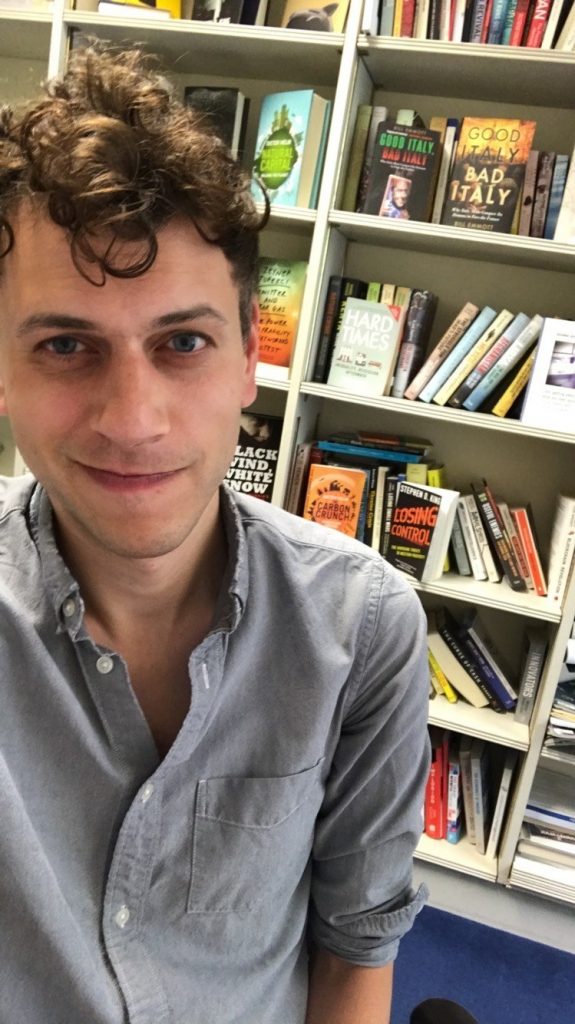Five Questions with Joseph Calamia, Senior Editor for Science
Joseph Calamia recently joined the Press as senior editor in the Books Division, acquiring new titles in the physical sciences, mathematics, oceanography, and digital studies. Joe came to us from Yale University Press, where he spent ten years, most recently, as senior editor for science and technology. We’ve been excited to welcome him not only to the Press but to Chicago, and by way of introduction, we put together some questions about his interests.

What are you looking for in a book, and what kind of project gets you excited?
Editors are excitable—I want to get excited. But, when pursuing a book for publication, I must answer two questions. First, what’s new? Second, who will read this? The first question considers originality; the second, audience. I should say that my answer to this question is not original. When reading a proposal, I hear these questions in my head. At commissioning meetings, I hear them from colleagues.
I should also say that the two questions are connected. One of the many great things about working at a university press is the encouragement to create a program that includes books for different audiences, including popular, course, and academic readers. For public-facing or “trade” books, it’s important to see an accessible and original provocation, intervention, or argument. For a coursebook or monograph, the audience is more targeted, and the contributions might be more nuanced.
What topic do you hope to never see another proposal about?
I have time for eye-opening proposals, even on seemingly well-worn topics. I don’t have time for proposals that fail to acknowledge scholars’ previous work on these topics.
In your previous acquisitions work, what book are you particularly proud of that speaks to your approach as an editor, and why?
Part of my work is to be connected to the communities that I publish. On campus visits, during conferences, and on phone calls, it’s my job to listen to people. When you learn about a community, you can publish relevant books and identify scholars who are rising stars. At Yale University Press, I was lucky, for example, to sign and publish first books by Zeynep Tufekci, Francis Su, and Priyamvada Natarajan.
As I step into a program with many projects already underway, I also want to say that an equally important part of my work is developing and shepherding books to help them reach their audiences. Sometimes editors inherit projects that we did not sign—these books are gifts. At Yale University Press, for example, I was lucky to work with madison moore on his first book, summarized succinctly in a New York Times headline, “He Literally Wrote the Book on Fabulousness.” At the University of Chicago Press, I am glad to have a chance to work on books commissioned by other editors, including Christie Henry, now the director of Princeton University Press. Seeing how other editors conceived of projects and continuing conversations that they started with authors are opportunities to learn.
When you’re not reading book proposals and manuscripts in your field, what kinds of books do you enjoy reading?
During my move, I finally had the chance to read Rebecca Makkai’s The Great Believers. Unfolding in Paris and Chicago, the book plays with time and place in ways that felt especially relevant as I prepared to move here. Its descriptions of a different epidemic, the AIDS crisis, also feel relevant. More recently, I read a beautiful novel by Catherine Chung called The Tenth Muse, about a mathematician’s search for identity and meaning in her work and life.
You’re new to Chicago—what are you looking forward to most in the city?
The coronavirus shutdown has made this a strange time to move; the city’s pause means I’m looking forward to a lot. For Christmas, my thoughtful family bought me memberships to several Chicago museums. I spent my first weekend at the Art Institute of Chicago, face pressed against the glass to see the details of the tiny Thorne Rooms. I’m also eager to spend more time, for work and fun, at the Museum of Science and Industry, Field Museum of Natural History, Adler Planetarium, and Shedd Aquarium. My first month’s exploration also included trips to Chicago bookstores, including Sandmeyer’s, Myopic Books, and the Seminary Co-op. The pandemic has upended bookshops and many other businesses. If you’re reading this and have the ability, please consider donating to their relief efforts—and buying books of course.